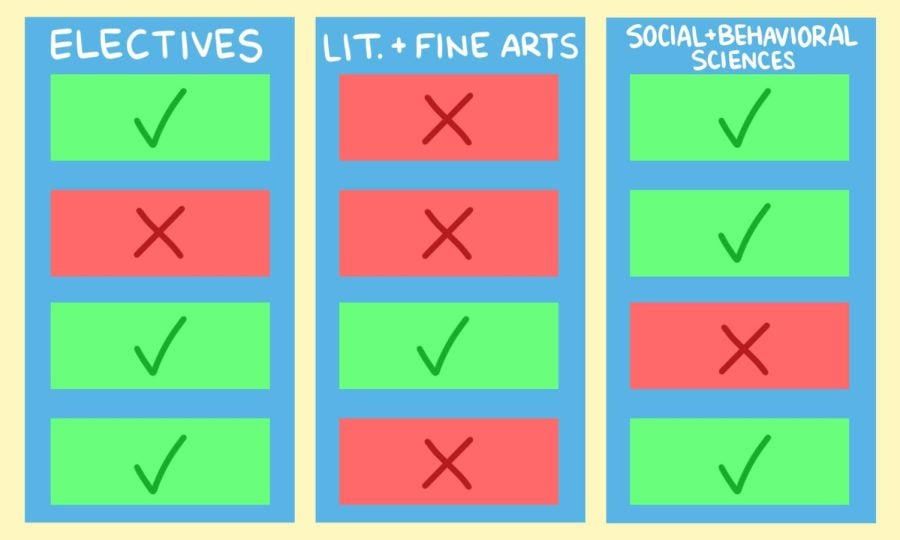The Best of Distros: 12 classes you should consider to fulfill your degree requirements
The Daily compiled a side-by-side comparison of three of the most important metrics from CTECs in the past year for these 12 classes.
August 12, 2022
Still trying to figure out what to take in the fall, or perhaps an easy way to breeze through distribution requirements? Or maybe you’re trying to plan out all of your undergraduate courses until you graduate? The Daily has you covered with a list of 12 low-commitment yet interesting classes to cover all your bases.
While this list is catered toward the Weinberg College of Arts and Sciences’ distribution requirements, students from other schools may find this list useful for fulfilling their own, similar requirements. Perhaps you’ll find an interesting class that you haven’t yet considered!
Natural Sciences (Area I)
Earth and Planetary Sciences 203: Earth System History
Offered in the fall, this class is perfect if you’re looking for a high-level understanding of Earth’s components as it evolved throughout time. According to last year’s Course and Teacher Evaluation Council surveys, the course is a great introduction to the topic in a no-homework environment, and it might be great for non-STEM majors.
Geography 341: Principles of Cartography
This Spring Quarter course will teach you everything you ever wanted to know about constructing and reading maps. CTECs from spring 2021 say this course was interesting, and in case you’re intimidated by the course number, it’s almost unanimously voted as taking fewer than three hours outside of class each week. Single-variable calculus is a prerequisite.
Formal Studies (Area II)
General Music 252: Harmony
Interested in taking a Bienen School of Music class at Northwestern without a need for musical talent? Lucky for you, this class is only open to non-music majors and covers the fundamentals of music theory and how composers write music. It’s offered this fall.
Computer Science 110: Introduction to Computer Programming
In an increasingly digital world, what better skill to know than how to code? This class is offered in Fall, Winter and Spring Quarter and will equip you with the knowledge to create visuals and animations in one of the most popular programming languages: Python. Plus, you wouldn’t have to worry about competing with your CS-major friends, since this class doesn’t satisfy their requirements!
Social and Behavioral Sciences (Area III)
Political Science 351: Politics of the Middle East
This class examines politics and government in the Middle East and North Africa from their emergence through the 21st century. Through comparative politics, this Winter Quarter class seeks to draw parallels between the states, societies and economies of different regions.
Psychology 244: Developmental Psychology
If you really liked AP Psychology in high school, this course provides a deeper understanding of cognitive, social and personality development through adolescence. In the fall, this course is offered only to freshmen — as long as you have the AP credit — and is at half the capacity compared to the Winter and Spring Quarters. If you’re interested in taking it but don’t fulfill the prerequisite, consider taking Psychology 110 for an introduction to psychology.
Historical Studies (Area IV)
Sociology 277: Introduction to Native American Studies
According to its CTECs from 2019 and 2021, this course is a must-take at NU with Sociology Prof. Beth Redbird — and her dog. This Fall Quarter class discusses Native American culture, history and inequality, which CTECs say is explained in a digestible and engaging manner. This course counts for both the Historical Studies and Social and Behavioral Sciences requirements.
Classics 380: Ancient Rome in Chicago, Classical Reception Studies
Want to get to know Chicago better while viewing it through the lens of ancient Rome? This course — with a required lab component — allows you to explore architecture and history through digital mapping of the city. This fall class counts as both a Historical Studies and Literature and Fine Arts distribution requirement.
Ethics and Values (Area V)
Philosophy 261: Introduction to Political Philosophy
Many CTECs say this winter course provides a solid introduction for students simply looking for an easy distribution requirement. The class studies both historical and contemporary figures in philosophy while thinking about the meaning of political values and the source of authority and stability.
Religious Studies 172: Introduction to Religion, Media and Culture
This class examines religion in the context of how it’s practiced versus how it’s portrayed in the media — from advertisements and comedy to social media, memes and body art. By the end of the course, you’ll not only have examined the intersection of religion and media but also created your own piece of creative work. Plus, if you can’t take this class in the fall, it’s offered again in the spring.
Literature and Fine Arts (Area VI)
Italian 275: To Love through Justice, Dante’s Divine Comedy
Whether you have an interest in Italian, Christian afterlife or the Middle Ages, this class explores the intersection of all three through poetry from Dante’s “Divine Comedy.” His work is examined from political, social and cultural lenses while drawing implications to modern-day themes and values. There are no prerequisites for this Fall Quarter course, which is taught in English.
Gender and Sexuality Studies 381: Queer Theory
This Winter Quarter course provides an introduction to theories of sexuality, examining the history, politics and media portrayal of queer theory through discussions and readings. Though this class is on the higher end in terms of time commitment, CTECs list this course as collaborative, interesting and comprehensive.
The Daily has also compiled a side-by-side comparison of three of the most important metrics from CTECs in the past year for these 12 classes.
Email: [email protected]
Twitter: @amittal27


